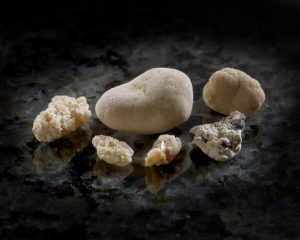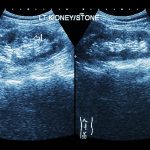 Kidney stones are a painful problem that can last for weeks in some cases, but you should not suffer when there are ways to get rid of the stones – including natural home remedies.
Kidney stones are a painful problem that can last for weeks in some cases, but you should not suffer when there are ways to get rid of the stones – including natural home remedies.
Kidney stones form when high levels of calcium, sodium, uric acid, or other crystal-forming substances start to build up in a person’s urine to levels the body just can’t get rid of. What happens is, these crystals chemically bond and form a stone inside the kidney. While some stones are small and pass through urine on their own with no symptoms, others can grow large and get lodged in the tube that allows urine to pass from the kidney to the bladder. In these situations, kidney stones cause pain.
Advertisement
Kidney stone pain is nothing to scoff at. Some women have described it as “worse than giving birth”. Knowing how to get rid of kidney stones at home fast can be of great relief to many people. Kidney stones can happen to anyone at any time, so knowing how to get rid of the associated pain may come in handy.
How to get rid of kidney stones at home?
Some people require surgery to remove kidney stones, but many can address the pain without an invasive operation. Before we take a look at how to get rid of kidney stones naturally without surgery, let’s first discuss some preventative measures to avoid kidney stone formation.
As mentioned above, we all have the potential for developing kidney stones. However, there are some steps that can decrease your risk. Take a look at the prevention tips below to see how you can lessen your chances of getting kidney stones.
- Drink lots of fluids to keep your urine less concentrated with waste
- Eat more fruits and vegetables, which make urine less acidic
- Reduce excess salt as it can add to stone formation
- Get sufficient amounts of calcium
Now, chances are, anyone who does get this condition would want to know how to get rid of kidney stones without surgery. While every case is different, especially in light of the different size of the stones, there are several home options.
The following list addresses how to get rid of kidney stones naturally with home remedies:
- Apple cider vinegar: Sufferers have reported that long-term use of apple cider vinegar can help cure and prevent kidney stones. Here’s how to get rid of kidney stones with apple cider vinegar. Mix the apple cider vinegar with honey and drink it several times during the day, or mix it with baking soda in a glass of water and drink it daily until the stones pass from the body.
- Uva ursi: This is a bearberry that grows naturally in the northern hemisphere. It is rich in tannins and flavonoids and seems to help soften kidney stones.
- Lemon juice and olive oil: Citric acid in lemons helps break down crystals in stones, while olive oil serves as a lubricant, making it easier to pass the stone.
- Dandelion root: It is a diuretic, which can help the stones pass. It can be consumed in tea or as a supplement.
- Nettle leaf: It has diuretic and antibacterial properties, which can help the stones pass. Nettle leaf can be used to make tea.
- Basil: Some studies have shown that basil can dislodge stones from the kidney and the urethra. Take a handful of basil leaves and steep them in boiling water to make a tea.
- Wheatgrass juice: Many kidney stone sufferers have found wheatgrass highly effective in treating the problem.
- Bran flakes: A study by the American Society of Nephrology suggests diets rich in whole grains reduce kidney stones, partially due to fiber content.
- Celery: A glass of raw celery juice can relieve kidney stone pain thanks to its antispasmodic properties. It is also a diuretic, helping increase the amount or urine to help flush out the stones.
- Kidney beans: Since they are high in fiber, they can be helpful in treating kidney stones.
- Lemonade/limeade/cranberry juice: These are high in citric acid, which can prevent crystals from forming in the first place or from increasing the size of your existing kidney stones.
- Water: Not only does it help to pass the kidney stones, it also reduces the risk of stone formation altogether.
Pregnant women with kidney stones are recommended bed rest and drinking a lot of water. In some situations, a procedure called an utereroscopy may be required. It has been found to be safe and effective during all stages of pregnancy.
Kidney stone pain can be excruciating and this means that in some cases over-the-counter medications or prescription medications are required to temper the agony. See a doctor if your pain is unbearable and you think you need extra pain management.
If you have seen people in your family suffer from kidney stones and you are concerned about getting stones yourself, keep in mind that exercise can be helpful. Research shows that moderate exercise reduces the risk of kidney stones by up to 31 percent. A low oxalate diet can also be helpful. The most common type of kidney stone is made up of calcium oxalate, so avoiding foods that are high in oxalate makes sense. Nuts, most berries, wheat, figs, grapes, tangerines, beans, beets, carrots, eggplant, kale, leeks, olives, peppers, potatoes, spinach, sweet potatoes, and zucchini are all considered high in oxalate. Now, if you like these foods, just remember to eat them along with foods that contain calcium. The oxalate and calcium will bind together before reaching the kidney, reducing your risk of developing stones. You should also be avoiding crash diets since they can increase the amount of uric acid in the bloodstream, thus increasing the risk of kidney stones.
Research also indicates that vitamin A helps people with kidney stones. In general, this vitamin is good for the urinary tract. Studies show that a daily dose of 25 milligrams of vitamin B6 can lower the oxalate level in the blood, decreasing the risk of kidney stones.
How long does it take to pass a kidney stone?
 In the vast majority of situations, kidney stones are small and pass on their own. Home remedies can be a good way to help the process along, but in some cases medical assistance is required. One of the first questions people with kidney stones ask is, how long does it take to pass a kidney stone naturally? Well, every case is different, it can be a few days or it can be weeks. There are a number of factors that can influence the time that it takes for stones to pass.
In the vast majority of situations, kidney stones are small and pass on their own. Home remedies can be a good way to help the process along, but in some cases medical assistance is required. One of the first questions people with kidney stones ask is, how long does it take to pass a kidney stone naturally? Well, every case is different, it can be a few days or it can be weeks. There are a number of factors that can influence the time that it takes for stones to pass.
- The size of the stone: Some may be small like a grain of sand, while others are the size of a golf ball. The larger it is, the harder it will be to pass. Kidney stones that have a diameter of five mm or more have a lower chance of passing naturally, and those that are nine mm or larger definitely require medical attention.
- The size of the patient: The larger a person is, the bigger the kidney stone tends to be. Metabolism in larger people is low and reduces the metabolism of calcium oxalate, thus increasing the size of stones. Also, uric acid concentration tends to be higher in those who are overweight, which can increase stone size.
- The size of the prostate: An enlarged prostate interferes with the passage of urine, making it harder for stones to pass.
- Pregnancy: Sometimes, an enlarged womb can put pressure on the urinary tract, making it difficult for stones to pass.
When kidney stones don’t pass easily on their own, many doctors suggest shock wave treatment. This is when shock waves outside the body target the kidney stones, causing them to break up. The tiny pieces are then more likely to pass. This procedure works in certain situations. A doctor will take into account the location of the stone, your overall health, and the health of your kidneys before recommending shock wave treatment. Pregnant women with stones do not get this type of therapy. People who have skeletal problems, are morbidly obese, or have bleeding disorders are not good candidates for shock wave either.
There are some medications that can help remove the stones from the body. These medications are normally suggested in situations where a person is facing some other serious health issue due to the fact that the stones are slow to move through the urinary tract.
When to see a doctor
Advertisement
About 15 percent of kidney stones need medical intervention. You should see a doctor if you are experiencing frequent urinary tract infections, have had a kidney transplant, or have only one kidney. If you are experiencing a lot of pain and are pregnant, seeking medical help is important.
You should follow any prescribed treatment. This includes taking medication. Remember, you can schedule a medical procedure if the stone doesn’t pass. Shock wave or ureteroscopy may be performed. If you have a large or irregular-shaped stone, an operation called nephrolithotomy may be an option. This involves making a small incision in the back to remove or break up the kidney stone.
Kidney stones are common. The lifetime incidence is almost 13 percent in men and about seven percent in women. While most cases clear on their own, situations that are stubborn and involve a lot of pain must be addressed by seeking advice from a medical professional.
